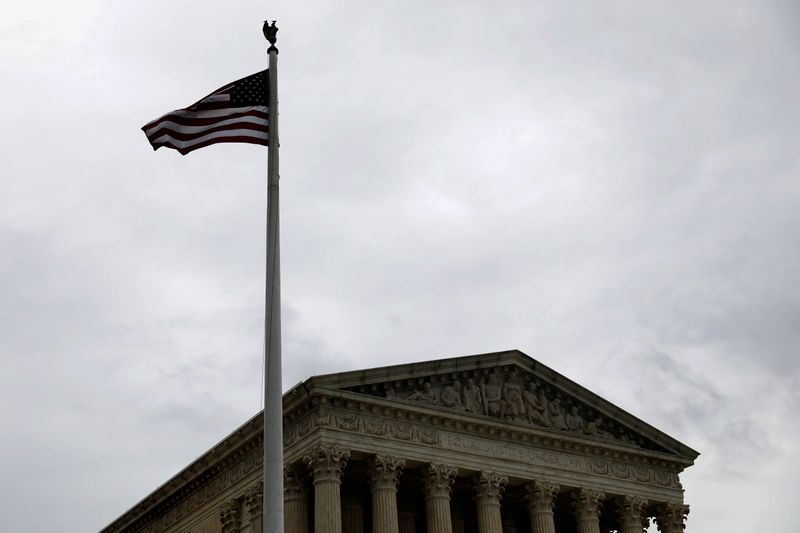By Lawrence Hurley
WASHINGTON (Reuters) - The U.S. Supreme Court begins its new nine-month term on Monday buffeted by the death of liberal Justice Ruth Bader Ginsburg, a Senate confirmation battle over her successor, the coronavirus pandemic and the approaching presidential election whose outcome the justices may be called upon to help decide.
Amid the maelstrom, the shorthanded court - with eight justices rather than a full complement of nine - also has a series of major cases to tackle, including a Republican bid to invalidate the Obamacare healthcare law set to be argued on Nov. 10, a week after Election Day.
If President Donald Trump's nominee to replace Ginsburg, federal appeals court judge Amy Coney Barrett, is confirmed as expected by a Senate controlled by his fellow Republicans, the court's ideological balance would tilt further rightward with a potent 6-3 conservative majority.
The court kicks off its term according to custom on the first Monday of October. It will begin unlike any other, with two cases being argued by teleconference due to the coronavirus pandemic. The court for the first time began hearing cases that way in May, and will continue doing so at least at the term's outset.
The court building, where large crowds of mourners gathered outside after Ginsburg's death of Sept. 18, remains closed to the public because of the pandemic.
The confluence of events is a test of leadership for conservative Chief Justice John Roberts, who in February also presided over a Senate impeachment trial that ended in Trump's acquittal on charges of abuse of power and obstruction of Congress for pressing Ukraine to investigate his Democratic election rival Joe Biden.
Roberts is known as a institutionalist who prizes the court's independence.
"He would like to be a steady hand and wants the court to be on a steady path," said Nicole Saharsky, a lawyer who argues cases before the justices.
The most anticipated case in the term's first week comes on Wednesday, when the justices weigh a multibillion-dollar software copyright dispute between Alphabet (NASDAQ:GOOGL) Inc's Google and Oracle Corp (NYSE:ORCL). The case involves Oracle's accusation that Google infringed its software copyrights to build the Android operating system used in smartphones.
In the Obamacare case, Barrett could cast a pivotal vote.
A group of Democratic-led states including California and New York are striving to preserve the 2010 law, formally known as the Affordable Care Act, in a case in which Republican-led states and Trump's administration are trying to strike it down.
Obamacare has helped roughly 20 million Americans obtain medical insurance either through government programs or through policies from private insurers made available in Obamacare marketplaces. It also bars insurers from refusing to cover people with pre-existing medical conditions. Republican opponents have called the law an unwarranted intervention by government in health insurance markets.
The Supreme Court previously upheld it 5-4 in a 2012 ruling in which Roberts cast the crucial vote. It rejected another challenge 6-3 in 2015. Ginsburg was in the majority both times.
Barrett in the past criticized those two rulings. Democrats opposing her nomination have emphasized that she might vote to strike down Obamacare, although legal experts think the court is unlikely to do so.
RELIGIOUS RIGHTS
The court hears another major case on Nov. 4 concerning the scope of religious-rights exemptions to certain federal laws. The dispute arose from Philadelphia's decision to bar a local Roman Catholic entity from participating in the city's foster-care program because the organization prohibits same-sex couples from serving as foster parents.
The justices already have tackled multiple election-related emergency requests this year, some related to rules changes prompted by the pandemic. More are likely.
The conservative majority has sided with state officials opposed to courts imposing changes to election procedures to make it easier to vote during the pandemic.
Trump has said he wants Barrett to be confirmed before Election Day so she could cast a decisive vote in any election-related dispute, potentially in his favor. He has said he expects the Supreme Court to decide the outcome of the election, though it has done so only once - the disputed 2000 contest ultimately awarded to Republican George W. Bush.
Democrats have said they will query Barrett during confirmation hearings set to begin on Oct. 12 on whether she should recuse herself in certain election-related cases. Justices have the final say on whether they step aside in a case.
Jeffrey Rosen, president of the nonprofit National Constitution Center, said at an event on Friday hosted by the libertarian Pacific Legal Foundation that he expects the court either to stay out of major election cases or, if unable to do so, to try to reach a unanimous outcome.
"The court's legitimacy is crucially important to all the justices in this extraordinarily fragile time," Rosen added.

If the court is divided 4-4 in any cases argued before a new justice is seated, it could hold a second round of oral arguments so the new justice could participate.